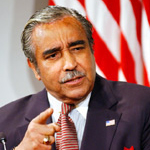Quote of the day: We have to talk about the issue of who we send to war, and Keith Olbermann and Larry O'Donnell have made a major contribution
>
 "A military relative of mine put it to me this way recently when I was visiting an Army base. He said that the American military is at war, but America is not at war. They feel this segregation. They know they're being sent to do a job that none of us would consider doing. . . .
"A military relative of mine put it to me this way recently when I was visiting an Army base. He said that the American military is at war, but America is not at war. They feel this segregation. They know they're being sent to do a job that none of us would consider doing. . . ."All of us political pundits in makeup on chat shows are unanimous in one characteristic, Keith, and that is that we are combat cowards. Not one of us has ever been in combat. . . .
"On the eve of a family holiday, this country has to think about this."
--political commentator Lawrence O'Donnell Jr., to Keith Olbermann last night on Countdown
 There has been some lively discussion in the comments on my recent post about Rep. Charles Rangel's proposal to reinstitute the military draft--this time mostly without exemptions. More important than anything, it seemed and seems to me, is the minimal discussion allotted to the issues at stake here.
There has been some lively discussion in the comments on my recent post about Rep. Charles Rangel's proposal to reinstitute the military draft--this time mostly without exemptions. More important than anything, it seemed and seems to me, is the minimal discussion allotted to the issues at stake here.We're going to have to start learning how to have serious issue discussions--and, yes, arguments. It's a habit that was rendered unnecessary, possibly impossible, in the Age of Bush, in which most "comment" has focused on the stupidity, criminality and/or immorality of the utterances coming out of the administration and its cohorts. The midterm election has changed all of that. Now we have to figure out how to thrash out real policy matters. And goodness knows, the corruption, ideological depravity and rank incompetence of the federal government's performance these last six years has left a multitude of issues in urgent need of solution.
At least on the issue of who fights our wars, on last night's Countdown Keith Olbermann came through in a big way, thanks in no small part to frequent guest Larry O'Donnell. I can't say he's ever bowled me over with his insights, but last night he was gangbusters. Keith's first question got him off to a fast start.
KEITH OLBERMANN: Should Congressman Rangel's draft proposal actually be taken seriously when the new session of Congress begins, and how would serious discussion of a draft change the debate about an exit strategy for Iraq? How would it affect any future military action that the administration might be contemplating against, say, Iran or North Korea?
LAWRENCE O'DONNELL: I think it should be taken seriously this time, and Charlie Rangel seems to be taking it seriously this time. He proposed it two years ago and let on right away that he wasn't serious, he was just trying to make a point, that the burden of this war is not fairly shared in this country. This time he is very serious. He's already introduced a bill. It's specific. It says absolutely no deferments except for health and conscience--he would allow conscientious objectors. And I actually think it would be a good thing, a smart thing for the Democrats, for Nancy Pelosi, to allow this bill to be debated on the House floor. It has no chance of passing. But the debate would focus the issue of what is going on in Iraq now and who are we asking to go there?
 We are at the "can't leave, can't win" stage. That's what Henry Kissinger has described it as, so that we can't win this war but we leave, and we can't leave for face-saving reasons, we can't leave because Iraq will become destabilized--never mind that it's not stabilized now, and never mind that that's exactly what Henry Kissinger said about Vietnam, a country that two American presidents now have successfully visited, without any incident, because it is one of the most stable countries in the region, after Henry Kissinger said that was impossible.
We are at the "can't leave, can't win" stage. That's what Henry Kissinger has described it as, so that we can't win this war but we leave, and we can't leave for face-saving reasons, we can't leave because Iraq will become destabilized--never mind that it's not stabilized now, and never mind that that's exactly what Henry Kissinger said about Vietnam, a country that two American presidents now have successfully visited, without any incident, because it is one of the most stable countries in the region, after Henry Kissinger said that was impossible.So we now know where we are in this war. We know exactly where we are. It is the echo of John Kerry's line about Vietnam. We're at the stage where we can fairly ask ourselves: Who is going to be the last soldier who dies for a mistake? And we should ask ourselves how that soldier got there, and why it's not a member of our family.
Keith asked whether the Rangel proposal should be looked at "to some degree" like Jonathan Swift's "A Modest Proposal," in which Swift suggested that the solution to the Irish famine was for the Irish to eat their own children. Larry's remarkable reply was spoken virtually without pause or hesitation.
LAWRENCE O'DONNELL: We're at the point, Keith, where there are no good ideas. And the draft may not be a good idea, and it may not be something I would actually support or vote for if I was in the Congress, but I would want to hear the debate, the debate that centers on the question of who are we putting out there? Who is now in the line of fire in a war that America has turned against and does not believe it can win? And morally, how do we leave those people in that line of fire?
And is it something we're able to do because we don't know them? Because 99 percent of this country has no relationship to anyone serving in Iraq. They don't have a friend there, they don't have a family member there. This is something we have to confront. This is a moral question now, because it's very clear we're not going to have anything we can call a win there, and once you know that about a military exercise, you have a very difficult case in justifying why military lives should continue to be risked.
Because we have an all-volunteer army, we have separated, we have segregated the military culture in this society from the rest of the society, and they know it. A military relative of mine put it to me this way recently when I was visiting an Army base. He said that the American military is at war, but America is not at war. They feel this segregation. They know they're being sent to do a job that none of us would consider doing.
All of us political pundits in makeup on chat shows are unanimous in one characteristic, Keith, and that is that we are combat cowards. Not one of us has ever been in combat. Every one of us has avoided service in the war of our generation. Every one of us who comes on these shows to talk about this.
And to those who come on these shows now and want to say, "We can't leave, but we might not win," I have to say to them, "Why aren't you in Iraq now? And if you're too old, why weren't you in Vietnam, why weren't you in the war that came your way?" Why is this something we delegate to other people, to be in wars that we know we're going to lose, and we know we're going to lose lives while we're watching ourselves lose?
Out of respect for Larry's statement, Keith suggested deferring the many political and other questions it raised to another occasion. Larry had a thought about that.
LAWRENCE O'DONNELL: On the eve of a family holiday, this country has to think about this.



2 Comments:
i am a new reader to your blog and i am so grateful that i have found you / i saw O'Donnell on Olberman's show and i saw him as well on Scarborough country where Michael Crowley also appeared / Michael looked like he had not been born yet during the Vietnam war and he hardly got in a word between O'Donnell and the oppo guest but when he did he used Kerry's line about asking the last man to die for a mistake
my daughter told me the check out ladies at the local store (we are in a very small town in SE Utah) were talking about the draft ! i told her about Charlie Rangel proposing the draft legislation and his purpose in provoking debate / apparently this is working
daughter reported that one of the ladies suggested letting all the prisoners out to enlist and the other reminded her of the atrocities being committed by many of our people and she replied, oh yeah, we dont want any more of that
a few of our young men are over there
well, thanks for letting me comment / and oh, i didnt know about the land grab in paraguay / i have sent your link to my son.out.law
Katherine Hunter
Welcome, Katherine, and thanks for sharing your thoughts.
I wouln't be at all suprised to learn that there are people in the Pentagon--grappling with the increasing thinness of our military forces and the difficulty in filling recruiting quotas--who have been trying to figure out how to tap the manpower "resource" of our overflowing prisons.
Ken
Post a Comment
<< Home